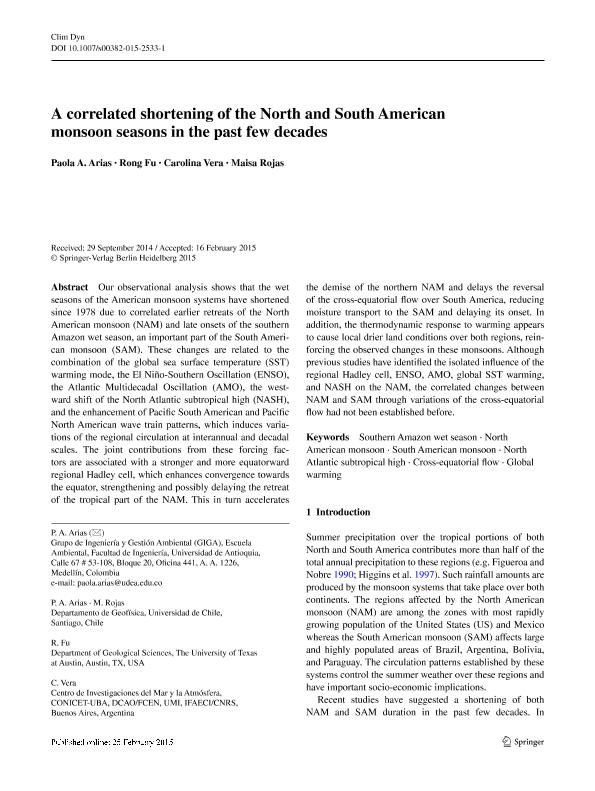Mostrar el registro sencillo del ítem
dc.contributor.author
Arias, Paola A.
dc.contributor.author
Fu, Rong
dc.contributor.author
Vera, Carolina Susana

dc.contributor.author
Rojas, Maisa
dc.date.available
2017-06-07T21:57:41Z
dc.date.issued
2015-12
dc.identifier.citation
Arias, Paola A.; Fu, Rong; Vera, Carolina Susana; Rojas, Maisa; A correlated shortening of the North and South American monsoon seasons in the past few decades; Springer; Climate Dynamics; 45; 11; 12-2015; 3183-3203
dc.identifier.issn
0930-7575
dc.identifier.uri
http://hdl.handle.net/11336/17729
dc.description.abstract
Our observational analysis shows that the wetseasons of the American monsoon systems have shortenedsince 1978 due to correlated earlier retreats of the NorthAmerican monsoon (NAM) and late onsets of the southernAmazon wet season, an important part of the South Americanmonsoon (SAM). These changes are related to thecombination of the global sea surface temperature (SST)warming mode, the El Niño-Southern Oscillation (ENSO),the Atlantic Multidecadal Oscillation (AMO), the westwardshift of the North Atlantic subtropical high (NASH),and the enhancement of Pacific South American and PacificNorth American wave train patterns, which induces variationsof the regional circulation at interannual and decadalscales. The joint contributions from these forcing factorsare associated with a stronger and more equatorwardregional Hadley cell, which enhances convergence towardsthe equator, strengthening and possibly delaying the retreatof the tropical part of the NAM. This in turn accelerates the demise of the northern NAM and delays the reversalof the cross-equatorial flow over South America, reducingmoisture transport to the SAM and delaying its onset. Inaddition, the thermodynamic response to warming appearsto cause local drier land conditions over both regions, reinforcingthe observed changes in these monsoons. Althoughprevious studies have identified the isolated influence of theregional Hadley cell, ENSO, AMO, global SST warming,and NASH on the NAM, the correlated changes betweenNAM and SAM through variations of the cross-equatorialflow had not been established before.
dc.format
application/pdf
dc.language.iso
eng
dc.publisher
Springer

dc.rights
info:eu-repo/semantics/openAccess
dc.rights.uri
https://creativecommons.org/licenses/by-nc-sa/2.5/ar/
dc.subject
Southern Amazon Wet Season
dc.subject
North American Monsoon
dc.subject
South America Monsoon
dc.subject.classification
Investigación Climatológica

dc.subject.classification
Ciencias de la Tierra y relacionadas con el Medio Ambiente

dc.subject.classification
CIENCIAS NATURALES Y EXACTAS

dc.title
A correlated shortening of the North and South American monsoon seasons in the past few decades
dc.type
info:eu-repo/semantics/article
dc.type
info:ar-repo/semantics/artículo
dc.type
info:eu-repo/semantics/publishedVersion
dc.date.updated
2017-06-07T20:46:30Z
dc.identifier.eissn
1432-0894
dc.journal.volume
45
dc.journal.number
11
dc.journal.pagination
3183-3203
dc.journal.pais
Alemania

dc.journal.ciudad
Berlin
dc.description.fil
Fil: Arias, Paola A.. Universidad de Antioquia; Colombia. Universidad de Chile; Chile
dc.description.fil
Fil: Fu, Rong. University of Texas at Austin; Estados Unidos
dc.description.fil
Fil: Vera, Carolina Susana. Consejo Nacional de Investigaciones Científicas y Técnicas. Oficina de Coordinación Administrativa Ciudad Universitaria. Centro de Investigaciones del Mar y la Atmosfera. Universidad de Buenos Aires. Facultad de Ciencias Exactas y Naturales. Centro de Investigaciones del Mar y la Atmosfera; Argentina
dc.description.fil
Fil: Rojas, Maisa. Universidad de Chile; Chile
dc.journal.title
Climate Dynamics

dc.relation.alternativeid
info:eu-repo/semantics/altIdentifier/url/http://link.springer.com/article/10.1007%2Fs00382-015-2533-1#
dc.relation.alternativeid
info:eu-repo/semantics/altIdentifier/doi/http://dx.doi.org/10.1007/s00382-015-2533-1
Archivos asociados
